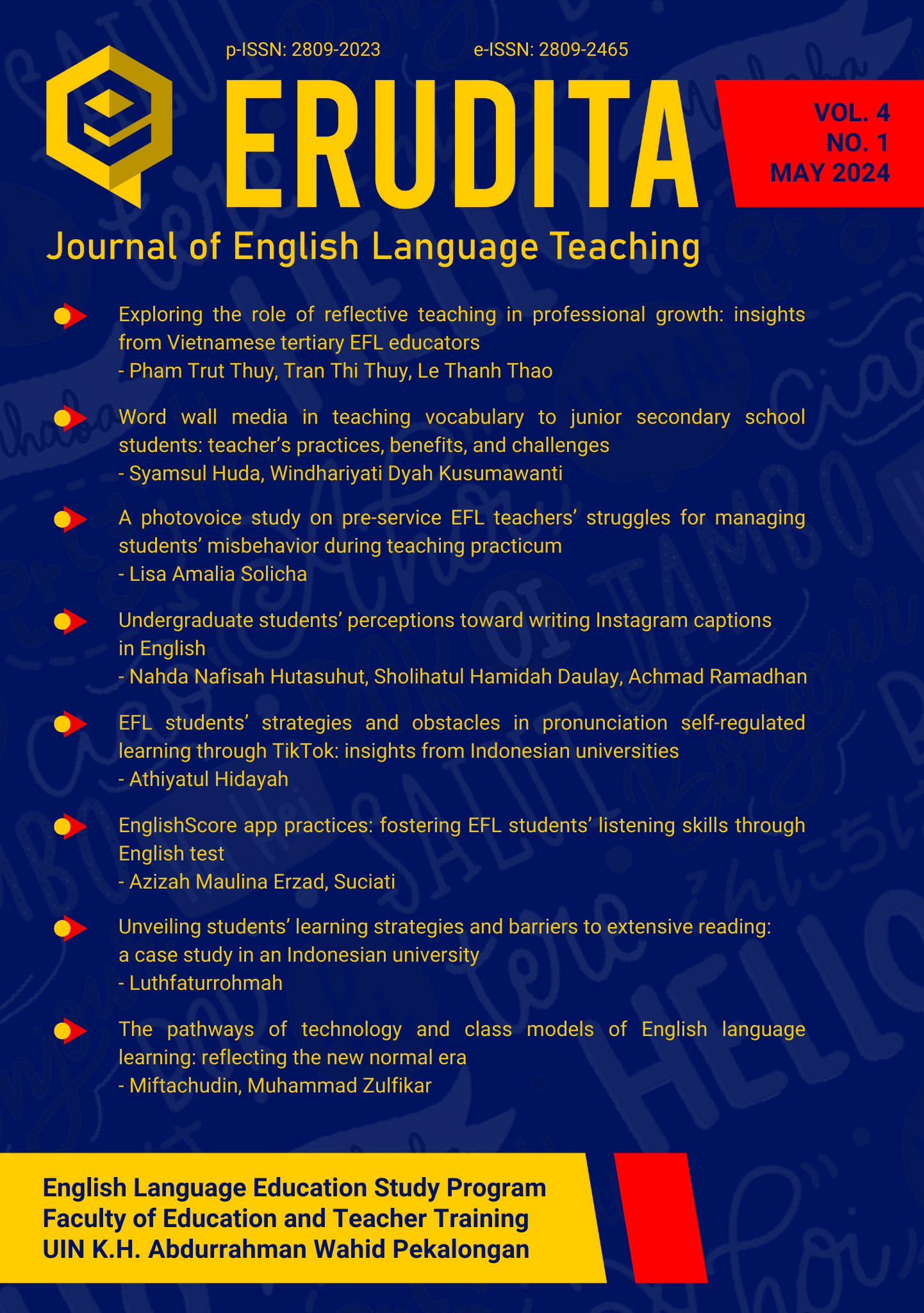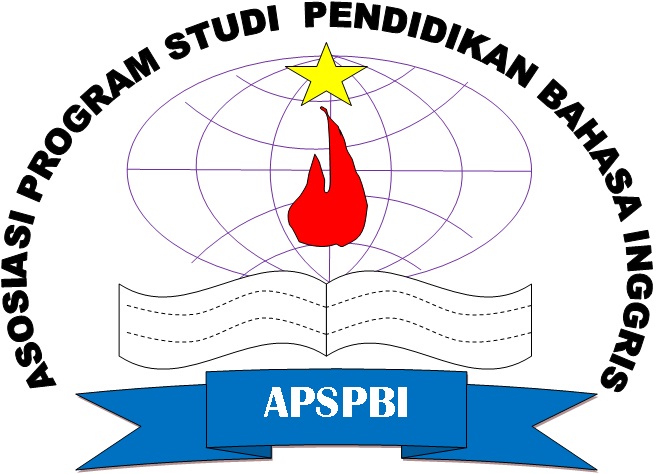Exploring the role of reflective teaching in professional growth: insights from Vietnamese tertiary EFL educators
DOI:
https://doi.org/10.28918/erudita.v4i1.7463Keywords:
Professional growth, Reflective teaching, Tertiary EFL educatorsAbstract
This qualitative study investigates the perceptions of Vietnamese tertiary English as a Foreign Language (EFL) teachers on the effectiveness of reflective teaching practices in their professional development. Reflective teaching is essential in continuously improving teaching methodologies and fostering a deeper understanding of instructional practices and student learning. Moreover, reflective teaching, a critical self-assessment methodology, is increasingly recognized as pivotal in adapting and enhancing teaching strategies in diverse educational environments. The study recruited nine Vietnamese tertiary EFL teachers from two institutions, representing a range of career stages: novice, mid-career, and near-end. Through semi-structured interviews, the research explored the teachers’ experiences and views on the integration, challenges, impact on professional identity, and the effects of reflective practices on student engagement and learning outcomes. Key findings revealed that reflective teaching significantly influences teaching methodologies across different career stages, with each group adapting these practices uniquely. Challenges such as time management and adapting to educational technologies were noted, along with their solutions. Reflective practices were instrumental in shaping teachers’ professional identities and enhancing student engagement and learning outcomes. The study underscores the importance of reflective practices in EFL teaching, emphasizing the need for tailored professional development programs and institutional support.
References
Akbari, R. (2007). Reflections on reflection: A critical appraisal of reflective practices in L2 teacher education. System, 35(2), 192–207. https://doi.org/10.1016/j.system.2006.12.008
Ayoobiyan, H., & Rashidi, N. (2021). Can reflective teaching promote resilience among Iranian EFL teachers? A mixed-method design. Reflective Practice, 22(3), 293–305. https://doi.org/10.1080/14623943.2021.1873758
Borg, S. (2013). Teacher research in language teaching: A critical analysis. Cambridge University Press.
Braun, V., Clarke, V., & Hayfield, N. (2023). Thematic analysis: A reflexive approach. SAGE Publications.
Colomer, J., Serra, T., Cañabate, D., & Bubnys, R. (2020). Reflective learning in higher education: Active methodologies for transformative practices. Sustainability, 12(9), 3827. https://doi.org/10.3390/su12093827
Dewey, J. (1933). Why have progressive schools? Current History, 38(4), 441–448. https://doi.org/10.1525/curh.1933.38.4.441
Elliott, R., & Timulak, L. (2021). Essentials of descriptive-interpretive qualitative research: A generic approach. American Psychological Association.
Farahian, M., & Parhamnia, F. (2022). Knowledge sharing through WhatsApp: Does it promote EFL teachers’ reflective practice? Journal of Applied Research in Higher Education, 14(1), 332–346. https://doi.org/10.1108/JARHE-12-2020-0456
Farahian, M., & Rajabi, Y. (2022). An investigation into the level of reflection and barriers to EFL teachers’ reflective practice. International Journal of Research in English Education, 7(2), 81–100. http://doi.org/10.52547/ijree.7.2.81
Farrell, T. S. (2008). Promoting reflective practice in initial English language teacher education: Reflective microteaching. Asian Journal of English Language Teaching, 18, 1–15.
Farrell, T. S. (2015). Reflective language teaching: From research to practice. Bloomsbury Publishing.
Jaeger, E. L. (2013). Teacher reflection: Supports, barriers, and results. Issues in Teacher Education, 22(1), 89–104.
Jay, J. K., & Johnson, K. L. (2002). Capturing complexity: A typology of reflective practice for teacher education. Teaching and Teacher Education, 18(1), 73–85. https://doi.org/10.1016/S0742-051X(01)00051-8
Kheirzadeh, S., & Sistani, N. (2018). The effect of reflective teaching on Iranian EFL students’ achievement: The case of teaching experience and level of education. Australian Journal of Teacher Education (Online), 43(2), 143–156.
Larrivee, B. (2008). Development of a tool to assess teachers’ level of reflective practice. Reflective Practice, 9(3), 341–360. https://doi.org/10.1080/14623940802207451
Mann, S., & Walsh, S. (2013). RP or ‘RIP’: A critical perspective on reflective practice. Applied Linguistics Review, 4(2), 291-315. https://doi.org/10.1515/applirev-2013–0013
Minott, M. (2019). Reflective teaching, inclusive teaching and the teacher’s tasks in the inclusive classroom: A literary investigation. British Journal of Special Education, 46(2), 226–238. https://doi.org/10.1111/1467-8578.12260
Mulryan-Kyne, C. (2021). Supporting reflection and reflective practice in an initial teacher education programme: An exploratory study. European Journal of Teacher Education, 44(4), 502–519. https://doi.org/10.1080/02619768.2020.1793946
Nguyen, C. D. (2017). Connections between learning and teaching: EFL teachers’ reflective practice. Pedagogies: An International Journal, 12(3), 237–255. https://doi.org/10.1080/1554480X.2017.1356725
Raven, N. (2014). Learning from experience: Reflective practices amongst higher education professionals. Reflective Practice, 15(6), 766–779. https://doi.org/10.1080/14623943.2014.944134
Richards, J. C., & Lockhart, C. (1994). Reflective teaching in second language classrooms. Cambridge University Press.
Salih, A. A., & Omar, L. I. (2022). Reflective teaching in EFL online classrooms: Teachers’ perspective. Journal of Language Teaching and Research, 13(2), 261–270. https://doi.org/10.17507/jltr.1302.05
Schön, D. A. (2017). The reflective practitioner: How professionals think in action. Routledge.
Shek, M. M. P., Leung, K. C., & To, P. Y. L. (2021). Using a video annotation tool to enhance student-teachers’ reflective practices and communication competence in consultation practices through a collaborative learning community. Education and Information Technologies, 26, 4329–4352. https://doi.org/10.1007/s10639-021-10480-9
Tajik, L., & Ranjbar, K. (2018). Reflective teaching in ELT: Obstacles and coping strategies. Journal of Research in Applied Linguistics, 9(1), 148–169.
Taylor, B., Francis, K., & Hegney, D. (2013). Qualitative research in the health sciences. Routledge.
Thao, L. T., Mai, L. X., & Thu, P. T. (2023). Unveiling obstacles in virtual English education: Echoes from Vietnamese learners. Erudita: Journal of English Language Teaching, 3(2), 119–131. https://doi.org/10.28918/erudita.v3i2.1173
Thao, L. T., Trut Thuy, P., Anh Thi, N., Hoang Yen, P., Thi Anh Thu, H., & Huong Tra, N. (2023). An insight into reflective teaching levels of Vietnamese EFL teachers in a premier language center. Cogent Education, 10(2), 2243118. https://doi.org/10.1080/2331186X.2023.2243118
Yen, P. H., Thi, N. A., Thuy, P. T., Tra, N. H., & Thu, H. T. A. (2023). Assessment strategies in outcome-based education: Preferences and practices among university lecturers in Vietnam. International Journal of Learning, Teaching and Educational Research, 22(10), 416–432. https://doi.org/10.26803/ijlter.22.10.23
Zeichner, K. M., & Liston, D. P. (2013). Reflective teaching: An introduction. Routledge.
Downloads
Published
How to Cite
Issue
Section
License
Copyright (c) 2024 Pham Trut Thuy, Tran Thi Thuy, Le Thanh Thao

This work is licensed under a Creative Commons Attribution-ShareAlike 4.0 International License.















